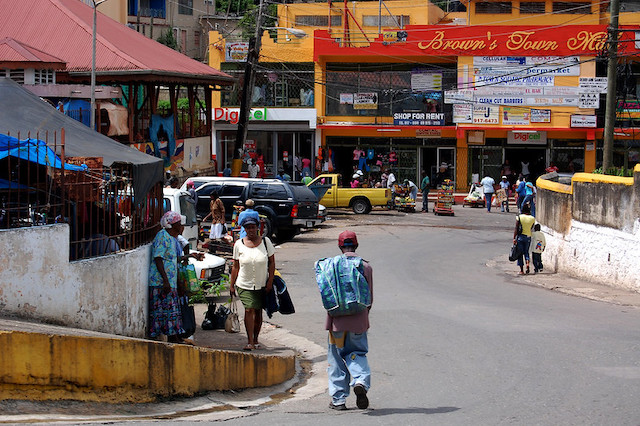10 Facts About Sanitation in Jamaica
 Being “the third-largest island in the Caribbean,” Jamaica boasts in both natural beauty and vibrant culture. Although many recognize the country for its white-sand beaches and crystal clear water, the native population still struggles for proper sanitation in some areas. While some regions of the country, like Montego Bay, are undoubtedly luxurious, the more rural areas lack sufficient sewage systems and drinking water. Below is a list of 10 facts about sanitation in Jamaica.
Being “the third-largest island in the Caribbean,” Jamaica boasts in both natural beauty and vibrant culture. Although many recognize the country for its white-sand beaches and crystal clear water, the native population still struggles for proper sanitation in some areas. While some regions of the country, like Montego Bay, are undoubtedly luxurious, the more rural areas lack sufficient sewage systems and drinking water. Below is a list of 10 facts about sanitation in Jamaica.
10 Facts About Sanitation in Jamaica
- Jamaica has several rich, natural water sources; however, it also has irregular rainfall. The drier regions of Jamaica suffer from the uneven distribution of rain, which contributes to a lack of potable water. Being in the Caribbean, tropical islands such as Jamaica rely heavily on the rainy season for drinking water. With the recent droughts, Jamaica has experienced a consequential water shortage, a significant factor in the island’s sanitation conditions.
- One of the solutions to the uneven water distribution is rainwater harvesting. Jamaicans in especially dry areas of the country will collect rainwater through a cistern. A household’s cistern will typically be a large room under the house capable of storing several gallons of water. In an effort to conserve this water, the government recommends minimal water usage for daily routines such as showering, dishwashing and even flushing the toilet.
- The Water Resources Act of 1996 requires the government to provide adequate water access to its citizens through proper management and allocation. Following the establishment of this law, the Jamaican government promised to have a sufficient sewage system accessible to all citizens by 2020. However, with the recent events following the COVID-19 pandemic, these efforts have been delayed. It is unclear whether this goal will still be reached this year or when the government plans to achieve the objective.
- At least 98% of urban areas of Jamaica have access to drinking water. That number falls to 88% in rural areas. These numbers have remained relatively steady for the past 10 years.
- While the numbers for potable water availability are relatively high, the numbers for piped water access are much lower. Only 45% of Jamaicans in rural areas have piped water access. The number for piped water access in rural areas is nearly half of that for potable water access. In urban areas, however, 70% of its population has piped water.
- Excessive trash is a common trait among Jamaican cities. With a lack of public sanitation facilities and curbside garbage collection in several areas, Jamaicans are faced with an ongoing sediment problem. Without effective waste removal procedures, a number of contaminants seep into the water.
- Vision Jamaica 2030 is a long term national development plan that aims to make Jamaica a fully developed country by the year 2030. Despite its size, Jamaica is still considered an underdeveloped nation. The main factors contributing to this status are its sanitation standards, political structure and the overall economy.
- Jamaica’s wastewater sector’s insufficient operations are primarily due to outdated technology faulty plant structures. These as well as a lack of proper maintenance and staff training have a substantial effect on the country’s sanitation conditions. A number of households and even the coasts suffer from the contaminated water culminated from these conditions.
- The National Water Commission (NWC) produces potable water to a majority of Jamaican citizens. During recent events of the COVID-19 pandemic, the company has waived all late fees for its customers for the next three months and established an assistance program that provides a “30% write off on outstanding bills.” They are continuing to evaluate the situation and make decisions that financially benefit the people of Jamaica.
- There are recommendations for people traveling to Jamaica. Taking steps can ensure that their available water is safe to drink. Waterborne diseases are especially common in Jamaica due to a lack of potable water maintenance. In order to combat this, Jamaicans make a habit of always boiling their water or treating it before consuming it. It is also a common practice to purchase bottled water for drinking to conserve cistern water for cleaning purposes.
Despite the country’s natural beauty, Jamaica’s natives still face daily obstacles that prevent them from living a healthy life. Sanitation issues in the country are a result of insufficient waste removal procedures, inadequate plant management and an uneven distribution of rainfall. The good news is that the country is a constant work in progress with the goal of dissolving its sanitation problem. Recent and unprecedented events have certainly interrupted the country’s advancement. However, Jamaicans are still determined to escape their title as an underdeveloped country. These 10 facts about sanitation in Jamaica reflect the country’s adversity and ability to improve its current conditions.
– Brittany Carter
Photo: Flickr
